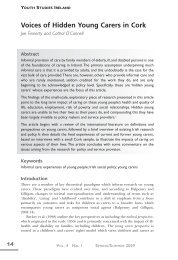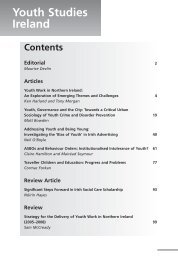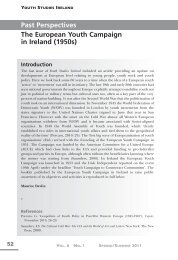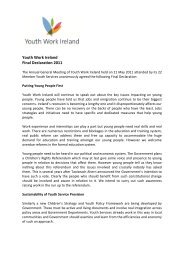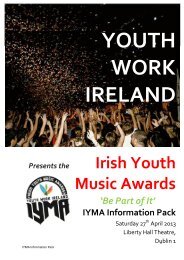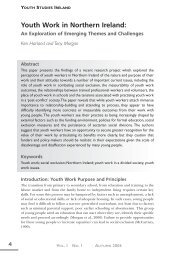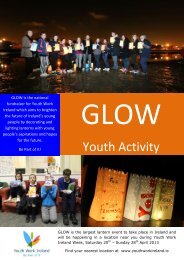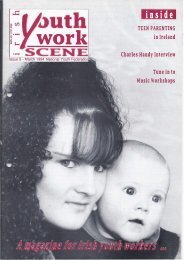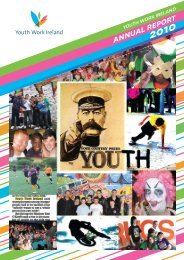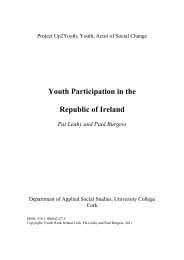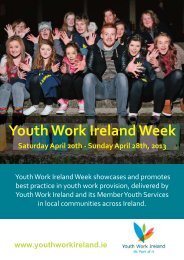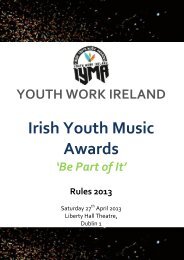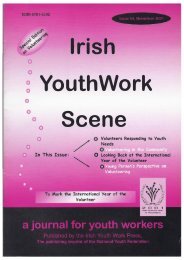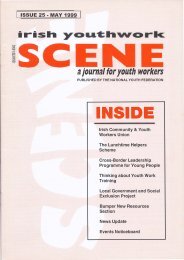Issue 31: March 2001 - Youth Work Ireland
Issue 31: March 2001 - Youth Work Ireland
Issue 31: March 2001 - Youth Work Ireland
Create successful ePaper yourself
Turn your PDF publications into a flip-book with our unique Google optimized e-Paper software.
seen pornography.• Of those who had seen pornography, 3 out of 4young men had accessed Internet porn, comparedto I in 3 young women. Home computers are themost common access point, with almost half (48%)using their own and a third (33%) using friends.• 49% of young men and <strong>31</strong> % of young womenreported that pornography made them feel betterabout sex as they learnt about it and it helped theirperformance. However, 1 in 5 (20%) reportednegative impacts and felt it was degrading andexploitative.Safe and Unsafe Sex• 1 in 5 young people (19%) admitted having sexwhen drunk (drugged, and focus group discussionshowed that there is a sexual culture where drinkand drugs are seen both as an excuse to have sex,as well as to eschew responsibility for oneself andothers. Getting /being drunk clearly interfered withyoung men and young women's clarity about themeaning of consent.1 Having sex when drunk/drugged left the largestgroup of young men feeling that it was ok andnormal whereas the largest group of young womenreported feeling dirty/horrible, something no youngmen reported feeling.• 17% of young people reported that they had hadunprotected sex.Double Standards• 50% of young people believe there is still a doublestandard between boys and girls regarding sex, with56% of young people saying that girls are calledsluts or thought less of, if they have multiplepartners, and 55% saying that boys get respect formultiple partners.Personal Safety and Place• 55% expressed concerns about safety in the street- of this group, 37% concerned about physical attack29% about street crime, and 25% about sexualattack (this group comprised almost completely offemales). Being stalked kidnapped and followedwere also concerns articulated by young women.1 46% had concerns for safety in discos/clubs/pubs.Here, fear of physical attack and fear of rape as aresult of being drugged, and of sexual assault ingeneral stood out. The fear of physical attack wasshared by both groups, although felt somewhat morestrongly by young men, but fears about sexualassaults were overwhelmingly expressed by youngwomen.1 Almost 1 in 5( 19%) reported concerns about theirIrish <strong>Youth</strong><strong>Work</strong> Scenesafety in relationships, with 1 in 4 young womenexpressing concern, and 1 in 8 young men. Genderdifferences are further amplified when the preciseconcerns are examined. For young men, it isprimarily sexually transmitted diseases andpregnancy, whilst young women also fearpregnancy, but twice as many feared beingused/abused, and a few explicitly referred to fears ofrape.• Young women expressed more concerns for theirpersonal safety, and much of their anxiety revolvedaround forms of interpersonal abuse: a significantminority were explicit about their fears of rape andsexual assault, harassment or being abused withinrelationships.IsKnowledge of Abuse of Others su1 Being followed, flashed at, subjected to nasty Esexual comments, pressured to have sex, forced tohave sex, being sexually assaulted, hit by a partner,injured by a partner, being in fear of a partner, beingcontrolled by a partner.• 95% of young women and 84% of young menreported knowing someone who had experiencedone of the specific forms of harassment. 68% ofwomen and 47% of men reported knowing someonein at least 4 categories, while 5% of femalesreported they knew someone who had experiencedall 10 experiences. The person known wasoverwhelmingly female.• 1 in 4 young women reported knowing someonewho was forced to have sex, with the majorityreporting that it had happened to a peer.• 46% reported knowing someone who was hit by apartner (56% of females, <strong>31</strong> % of males) whilst halfwere peers, 8% reported their parents being hit by aparent. The perpetrator was overwhelmingly male(92%).• 53% of young people reported that they had beentold of this experience by another (65% of youngwomen, 36% young men). Very few young peoplereported either seeking assistance from others (3%)or confronting the perpetrator ( 1 % ).• All of the young people found providing support Idifficult, with the most common problems beingShearing upsetting accounts and uncertainty aboutSwhat action to take.uYoung People's Own Experiences Of AbuseEs• Being followed, flashed at, subjected to nastysexual comments, pressured to have sex, beingforced to have sex, being sexually assaulted, hit bya partner, injured by a partner, being in fear of apartner.• 81% of young women and 54% of young men<strong>March</strong> <strong>2001</strong>IssuEssIssuEs



